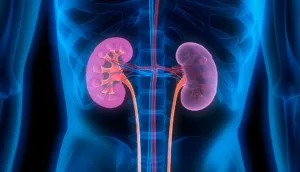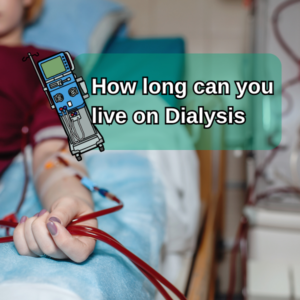+90 533 813 89 77
info@bookingforhealth.com

Kidney Diseases Questions
What meat is good for kidney disease?
For individuals with kidney disease, it’s essential to consume lean sources of protein. Examples of kidney-friendly meats include skinless chicken, turkey, fish, and lean cuts of beef or pork. It’s advisable to limit red meat intake and choose cooking methods that reduce the amount of fat, such as grilling or baking.
What stage of kidney disease is protein in urine?
Protein in the urine, also known as proteinuria, can occur at any stage of chronic kidney disease (CKD). However, it becomes more common as the disease progresses to later stages, especially stages 3, 4, and 5 (end-stage renal disease or kidney failure).
When to stop metformin in chronic kidney disease?
The use of metformin in chronic kidney disease requires careful consideration. In some cases, metformin may need to be stopped or the dosage adjusted based on the individual’s kidney function, particularly if the glomerular filtration rate (GFR) is significantly reduced. It’s crucial to consult a healthcare professional to determine the appropriate use of metformin in the presence of kidney disease.
Does kidney disease cause high blood pressure?
Kidney disease can cause high blood pressure, a condition known as renal hypertension. When the kidneys are damaged, they may not effectively regulate the body’s fluid balance and produce hormones that control blood pressure, leading to elevated blood pressure levels.
Does kidney disease cause pain?
In some cases, kidney disease can cause pain. For example, kidney stones and kidney infections can be painful. However, in the early stages of chronic kidney disease (CKD), there may not be any noticeable pain or symptoms.
How fast does kidney disease progress?
The rate of progression of kidney disease can vary widely depending on the underlying cause, individual health factors, and the effectiveness of management strategies. In some cases, kidney disease may progress slowly over many years, while in others, it may progress more rapidly. Regular monitoring and proper management are essential to slow disease progression.
How many stages are there in kidney disease?
Chronic kidney disease (CKD) is typically classified into five stages, ranging from stage 1 (mild kidney damage) to stage 5 (end-stage renal disease or kidney failure). The stages are determined based on the level of kidney function, as measured by glomerular filtration rate (GFR) and the presence of kidney damage.
How many stages in kidney disease?
Chronic kidney disease (CKD) is typically classified into five stages, ranging from stage 1 (mild kidney damage) to stage 5 (end-stage renal disease or kidney failure). The stages are determined based on the level of kidney function, as measured by glomerular filtration rate (GFR) and the presence of kidney damage.
What drugs to avoid with kidney disease?
There are various drugs and medications that may need to be avoided or adjusted in individuals with kidney disease. It’s essential to consult a healthcare professional to determine which drugs are safe to use based on the individual’s kidney function and health status. Common drugs that may need to be adjusted or avoided include certain pain medications, some antibiotics, and certain blood pressure medications.
What is stage 1 kidney disease?
Stage 1 kidney disease is the early stage of chronic kidney disease (CKD) where there is mild kidney damage but normal or mildly reduced glomerular filtration rate (GFR) ≥90 ml/min/1.73m². At this stage, kidney function is still relatively preserved, and symptoms may be minimal.
Which blood pressure medicine is best for kidney disease?
The choice of blood pressure medication for kidney disease depends on various factors, including the individual’s kidney function and any other medical conditions they may have. Angiotensin-converting enzyme (ACE) inhibitors and angiotensin receptor blockers (ARBs) are commonly prescribed for kidney disease because they can help protect the kidneys and lower blood pressure. However, the choice of medication should be determined by a healthcare professional.
Why does kidney disease cause diarrhea?
Kidney disease can cause diarrhea due to various factors, such as electrolyte imbalances, changes in gut motility, and the accumulation of waste products in the body. Additionally, certain medications used to manage kidney disease can also cause gastrointestinal disturbances, including diarrhea.
Does kidney disease affect adrenal glands?
Kidney disease can impact the function of the adrenal glands, which are located on top of each kidney. In advanced stages of kidney disease, hormonal imbalances can occur, affecting the production of hormones by the adrenal glands.
How does kidney disease cause hypertension?
Kidney disease can cause hypertension (high blood pressure) through various mechanisms. The kidneys play a crucial role in regulating blood pressure by controlling the balance of salt, water, and hormones in the body. When the kidneys are damaged, they may not effectively regulate blood pressure, leading to hypertension. Additionally, the presence of kidney disease-related inflammation and altered hormone levels can further contribute to elevated blood pressure.
How to stop itching from kidney disease?
To stop itching from kidney disease, it’s essential to address the underlying cause, such as managing kidney disease with appropriate medications and lifestyle changes. Additionally, using fragrance-free and hypoallergenic moisturizers, avoiding hot showers, and wearing loose-fitting clothing may provide relief. Consultation with a healthcare professional is crucial to determine the best course of action.
Is chronic kidney disease reversible?
The reversibility of chronic kidney disease (CKD) depends on the specific cause and stage of the disease. Some forms of CKD may be partially reversible, especially in the early stages, if the underlying cause is treated effectively. However, in advanced stages, when the kidneys are significantly damaged, CKD may not be completely reversible, and management focuses on slowing disease progression and improving quality of life.
Is kidney disease a disability?
Yes, kidney disease can be considered a disability, particularly in advanced stages that require dialysis or transplantation. Many countries recognize end-stage renal disease (ESRD) as a disability, providing benefits and support for affected individuals who may face challenges in work and daily life due to their condition. However, disability status varies based on individual circumstances and local regulations.
Is oatmeal good for kidney disease?
Oatmeal can be a kidney-friendly option for individuals with kidney disease. It is a good source of fiber and nutrients without containing excessive amounts of sodium, phosphorus, or potassium. However, portion control and individual dietary needs should be considered, as the nutritional requirements may vary depending on the stage and severity of kidney disease.
What is end-stage kidney disease?
End-stage kidney disease (ESRD), also known as stage 5 chronic kidney disease (CKD), is the most severe form of kidney disease where the kidneys have lost nearly all of their function. At this stage, the kidneys can no longer effectively filter waste products and excess fluids from the blood, necessitating renal replacement therapies like dialysis or kidney transplantation for survival.
What is stage 3b chronic kidney disease?
Stage 3b chronic kidney disease (CKD) is a classification based on the level of kidney function. It indicates moderately reduced kidney function with a glomerular filtration rate (GFR) between 30 and 44 milliliters per minute per 1.73 square meters. In this stage, there may be moderate kidney damage.
What is stage 5 kidney disease?
Stage 5 kidney disease is the most advanced stage of chronic kidney disease (CKD) and is also known as end-stage renal disease (ESRD). At this stage, the glomerular filtration rate (GFR) is less than 15 milliliters per minute per 1.73 square meters, indicating severely reduced kidney function. Individuals with stage 5 kidney disease require renal replacement therapies like dialysis or kidney transplantation for survival.
What is the leading cause of kidney disease?
The leading causes of kidney disease are diabetes and hypertension (high blood pressure). Together, they account for a significant proportion of cases of chronic kidney disease (CKD). Other common causes include polycystic kidney disease, kidney stones, autoimmune diseases affecting the kidneys, and certain infections.
What not to eat with kidney disease?
Individuals with kidney disease may need to limit or avoid certain foods to manage their condition effectively. Common foods to avoid or limit include high-sodium foods, processed and canned foods, high-potassium foods (e.g., bananas, oranges, potatoes), high-phosphorus foods (e.g., dairy, nuts, colas), and high-oxalate foods (e.g., spinach, beets, chocolate). It is crucial to work with a healthcare professional or a registered dietitian to create a personalized meal plan.
What nuts are bad for kidney disease?
Nuts are generally a good source of protein and healthy fats but can be high in phosphorus, which may need to be limited in individuals with kidney disease, especially in later stages. Nuts with higher phosphorus content include almonds, Brazil nuts, cashews, and pistachios. People with kidney disease should consume nuts in moderation and consult their healthcare provider for specific dietary recommendations.
What should a diabetic with kidney disease eat for breakfast?
A diabetic with kidney disease can consider a kidney-friendly breakfast that is low in sodium, phosphorus, and potassium. Some options may include scrambled eggs with low-phosphorus vegetables, oatmeal made with water and topped with fresh berries, or whole-grain toast with a small amount of low-sodium peanut butter. It’s essential to work with a healthcare provider or a registered dietitian to create an appropriate meal plan tailored to individual needs.
What stage kidney disease requires dialysis?
Stage 5 kidney disease, also known as end-stage renal disease (ESRD), typically requires dialysis. At this advanced stage, the kidneys have lost nearly all of their function, and dialysis is needed to perform the essential function of filtering waste products and excess fluids from the blood.
What stage of kidney disease requires dialysis?
Stage 5 kidney disease, also known as end-stage renal disease (ESRD), requires dialysis. At this advanced stage, the kidneys have lost nearly all of their function, and dialysis is needed to perform the essential function of filtering waste products and excess fluids from the blood.
Does kidney disease cause weight loss?
In some cases, kidney disease can cause unintended weight loss. Factors contributing to weight loss in kidney disease include loss of appetite, changes in metabolism, fluid retention, and muscle wasting. However, it’s important to note that weight loss can also be caused by other medical conditions, and a healthcare professional should evaluate the underlying cause.
Is chronic kidney disease hereditary?
Some forms of chronic kidney disease (CKD), such as polycystic kidney disease (PKD), are hereditary and can be passed down through families. However, not all cases of CKD are hereditary, and many are caused by other factors like diabetes, hypertension, or autoimmune diseases.
Is kidney disease genetic?
Some forms of kidney disease have a genetic or hereditary component. For example, polycystic kidney disease (PKD) is a genetic condition that runs in families. However, not all kidney diseases are genetic, and many cases are caused by other factors like lifestyle choices, infections, or underlying health conditions.
Is weed good for kidney disease?
The safety and efficacy of using weed or cannabis for kidney disease have not been extensively studied, and there is limited scientific evidence to support its use in managing kidney disease. As such, it’s essential for individuals with kidney disease to avoid using weed or cannabis products without guidance from a healthcare professional.
What antihistamine is safe for kidney disease?
Antihistamines that are considered safe for individuals with kidney disease include cetirizine and loratadine. However, it is essential to consult a healthcare professional before using any antihistamine or over-the-counter medication, as individual health conditions and medications should be considered.
What helps with itching from kidney disease?
To help with itching from kidney disease, it’s important to address the underlying cause, such as managing kidney disease with appropriate medications and lifestyle changes. Additionally, using fragrance-free and hypoallergenic moisturizers, avoiding hot showers, and wearing loose-fitting clothing may provide relief. Consultation with a healthcare professional is crucial to determine the best course of action.



